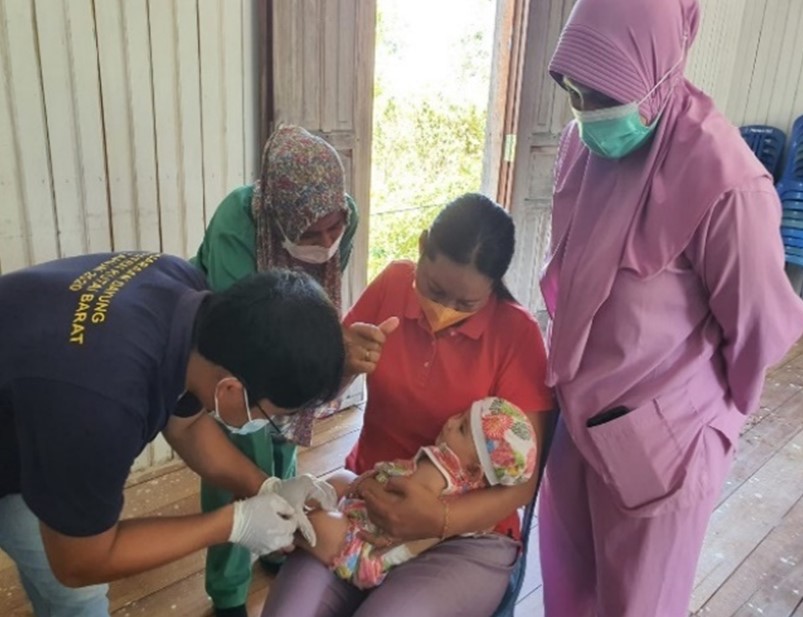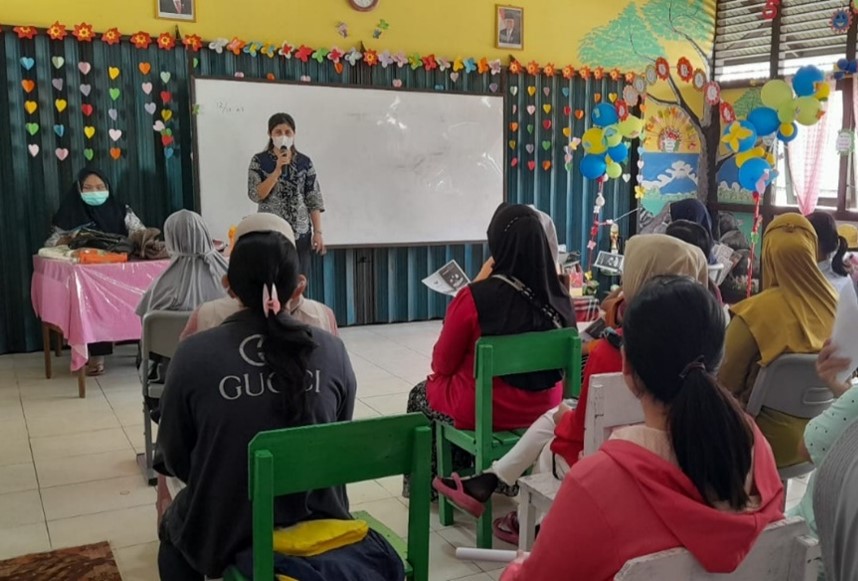After navigating the challenges of the COVID-19 pandemic, healthcare workers in Kalimantan found themselves confronting a new obstacle: the escalating incidence of vaccine-preventable diseases (VPD). Outbreaks in different districts underscored the importance of enhancing routine and catch-up immunization activities while responding to ongoing outbreaks rapidly.
Immunization rates in several districts in 2021-2022 are notably low, particularly in districts of Tapin and Hulu Sungai Tengah in South Kalimantan, Kutai Barat in East Kalimantan, Nunukan in North Kalimantan; and Singkawang City in West Kalimantan. This led outbreaks of diphtheria, pertussis and measles in various villages in the districts in 2022-2023. In these areas, WHO along with provincial health offices (PHOs), district health offices (DHOs) and primary healthcare centers (Puskesmas) have been working hand in hand to manage and respond to these outbreaks.
One of the collaborative work happened in Puskesmas Banua Padang in Tapin District, to conduct a systematic approach called Rapid Convenience Assessment (RCA) in response to a pertussis outbreak. On 5 December 2022, the RCA was started in Rantau Bujur Village, Tapin District, focusing on pentavalent vaccine coverage in children under five. Ten unvaccinated children were found and swiftly vaccinated. The team also supervised close contacts by visiting affected families. They collaborated with local paediatricians for comprehensive case identification and insights. Similarly, on 5 June 2023, a field visit for VPD case management was conducted, this time addressing suspected diphtheria cases in Hulu Sungai Tengah District. Emphasizing proactive case management, the team coordinated with health facilities and families to ensure adequate responses and maintain vigilant surveillance to curtail future outbreaks.
In East Kalimantan, between 12 to 14 June 2023, WHO joined hands with local health officials to analyse epidemiological data and identify areas with low vaccine coverage and high defaulters. They initiated measures to enhance surveillance sensitivity and introduced outreach services to address potential disease transmissions. During the mission, a significant observation was the low coverage of booster Pentavalent immunization in areas such as Kutai Barat District, which paved the way for potential pertussis transmissions. Addressing this, the teams introduced outreach services, bolstered by efficient vaccine management procedures, including the use of fridge tags and ensuring quality vaccine storage facilities.

Reno Febrianson, Immunization officer of PHC Gunung Rampah, provided catch-up immunization as a response of pertussis outbreak. Credit: WHO/Kornelius Son
According to Dr Resvianur, “By improving these aspects, we can prevent pertussis transmission and be adequately prepared for future VPD outbreaks. Our strategy for defaulter tracking, using ‘My Village My Home’, is geared towards this very objective for the upcoming year.”
Meanwhile, Nunukan District reported 53 suspected measles cases from December 2022 to February 2023. An outbreak response immunization (ORI) was initiated in March 2023, but community acceptance was low because of religious beliefs and the parents’ fear for adverse event following immunization. To overcome this, WHO and Nunukan DHO involved the Pemberdayaan Kesejahteraan Keluarga (Empowerment of Prosperous Families, PKK) organization to mobilize communities and produce educational videos. The Nunukan PKK prepared a tailored script for educational video in which Sri Kustarwati, the Head of Nunukan PKK, explained the dangers of measles and rubella, and encourage parents to bring their children for immunization. Sri Kustarwati also visited community based integrated health facility (Posyandu) to engage in discussions with parents, emphasizing the importance of completing their children’s immunizations as soon as possible. This contributed to improvement of ORI coverage, increasing from 32% out of 4,027 children in 4 villages at the beginning of the campaign to 63% by the end of it.
“Thinking long-term is our responsibility as parents. Providing immunization is the best investment we can give to our children’s future. Let them grow and live a life full of potential for Nunukan District,” said Sri Kustarwati to the parents during a visit to the Posyandu.

Nunukan PKK Head visited posyandu during ORI implementation, took a chance to educate the parents the importance of immunization and provide moral support for the children who were afraid to get vaccinated. Credit: DHO Nunukan/Yunita
In Singkawang City, diverse ethnic groups posed a challenge in achieving targeted immunization coverage. During WHO’s coordination meetings with the DHO, language barriers was identified as one of the factors that caused Singkawang to record only 42% coverage out of 13,791 children during the 2021 immunization month for school students (Bulan Imunisasi Anak Sekolah, BIAS). To address this challenge, the DHO developed educational materials not only in Indonesian, but also in local languages and dialects such as Hakka (locally known as Khek dialect), Madurese, Dayak, and Malay. These materials have been utilised and promoted in cross-sectoral and community meetings, leading Singkawang to record 84.1% coverage in 2022 BIAS, out of 14,098 children targeted in the campaign.

One of immunization campaign sessions targeting school students in Singkawang City, which used the multi-language posters developed by the Singkawang Health Office. Credit: WHO/Dedy Purwito
The urgency of combatting vaccine-preventable diseases cannot be overstated. These outbreaks not only present immediate health threats but signify potential systemic weaknesses. By proactively addressing these challenges, the foundation for a resilient healthcare system is laid — one that is capable of both preventing diseases and rapidly responding to outbreaks. This lays the groundwork for a future where public health crises, like the recent pandemic, can be better managed, safeguarding the well-being of Indonesia's populace.
Moving forward, the strategy of defaulter tracking, "My Village My Home", is set to be implemented in 2024, emphasizing early prevention. Additionally, there are plans to further bolster collaboration with organizations, engage more local communities, and create tailored educational materials, ensuring that the progress made is sustainable and widespread.
This activity was made possible through the generous support of the governments of Australia and the United States of America.
Written by the following WHO Indonesia personnel:
Meuthika Noor Fitriyana, Kornelius Son, I Gede Bayu Eka Putra Wibowo, Dedy Purwito, Vaccination Technical Officers; and Olivi Silalahi, National Professional Officer for Routine Immunization
